College: it's a depressing time. You're poor, you're hungry, and you're doing it all for a piece of paper that's pretty much just good for telling people how much you're willing to pay for a piece of paper. Unless you're getting a liberal arts degree. Because, you know, that'll pay itself off. (To any liberal arts graduates who were offended by that joke: remember to take the pickles off of my burger next time and maybe I won't make those jokes in the future.)
Well, like I said, you're poor and hungry, and you can solve both of those problems with gratuitous amounts of theft. So, you know, that's out of the way.
There was a time when lobsters were considered to occupy the bottom rung of the food chain. It was even considered cruel and unusual punishment to feed it to inmates. …Wow, I was going to write an article about fixing that liberal arts bullshit, but you know, kind of did myself in there. I guess I could just take this article in a different direction altogether.
Food. Everyone likes food. And boobs. But when I show people my boobs, Enrique Iglesias plays from nowhere and it inexplicably starts raining baby oil from all angles. So we'll stick with food.
Here we go, story time with Cole. (That's my name. Tell your friends.)
I live with three other dudes (totally not a gay witch sex coven or anything), and most of them cook. I've even watched them cook on occasion. It actually always goes better then I expect. Except for the time one of them made Jägerfish. (Yes, it's exactly what it sounds like. Yes, I can still hear the screams.) But sometimes I hear them expound on cooking tips they've heard somewhere before, and I think, "Well, that's not right."
But sure enough, Googling around reveals that a lot of people believe these myths about cooking. And since I love nothing more than crushing other peoples' beliefs, and have to make this vaguely college related (learning how to cook in college makes life less like scrotum—there, quota filled), I'm going to do that here today.
So, here they are, six cooking tips you've no doubt heard somewhere, that are absolute bullshit.
Cooking Myth #1: Adding salt or oil to your water helps.
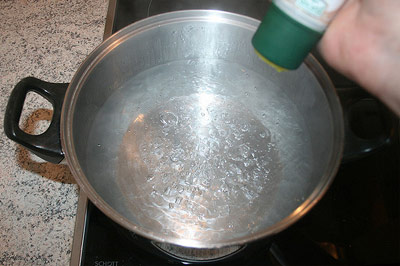
Most of us have heard this advice before. Add some salt to the water because salt water boils at a higher temperature then normal water. Because science.
And you know what? That is absolutely true. 100%.
I mean, you have a bag of salt lying around for every time you want to make spaghetti, right? Because while the science is correct on the whole boiling point thing, the science also says that you're not going to want to eat whatever unholy spawn you produce, because the amount of salt required to actually make a difference would be enough to draw attention from the slug mafia.
…Am I the only one who kind of wishes the slug mafia was real? I mean, they would be disgusting, if you actually had to touch them, kind of like children. But also, like children, if they're tiny enough, dressing them up in snappy suits is just absolutely adorable.
Moving on.
You're probably adding a tablespoon at most to a pot of water. The water laughs at you. It laughs at you and mocks your sexual prowess when you aren't paying attention. And maybe a little bit when you are.
Okay, so fuck that water. Fuck that water in its amorphous face! How much salt are we going to have to add in order to raise the temperature on that motherfucker? How hot do we want to get? Ten degrees? Twenty? All of the degrees?!?! Haha, that's not a thing you can do. You're adorable. Let's go for ten.
Let's raise the water about ten degrees. Enough to show the water you mean business. How much salt are we talking here, exactly? Assuming you're working with around a quart of water, you're looking at something like, 33 teaspoons of salt, give or take. No, seriously.
Yummy.
Well what about oil? To keep the noodles from sticking? That can't be bullshit that should be dispelled the instant you put the oil in, right? In case you didn't notice, water and oil don't mix. They settle in layers. They don't mix. Yes, it is true that the boiling of the water creates a sort of mixing effect, but it won't make a huge difference (turns out pasta isn't that sticky), and it will actually harm the noodles.
If you're making noodles, you're probably putting sauce on it, right? Well, if you get them all lubed up, then that sauce will not absorb or adhere properly, and believe it or not, that will affect the flavor.
So, go ahead and just stir the fucking noodles with a big stick or something. That will also keep them from sticking without ruining the taste.
Cooking Myth #2: Sear the meat, keep the flavor.
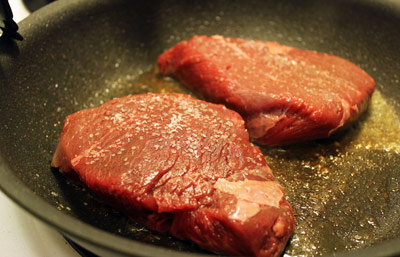
"Bullshit, Cole!" you scream, leaping up from your chair and throwing Cheetos everywhere. (In my head, everyone who reads my articles browses the internet in the same way I do: drinking grain alcohol while naked and munching on Cheetos. At Starbucks.) "I've seen this shit on TV! Actual people who cook tell me this all the time, Cole. Hell, they even teach this in some culinary schools! You're stupid and people want to hit you."
And while both of those things may be true, that doesn't change anything. Steak will stay steak no matter how you choose to heat its delectable flesh.
This cooking myth started a couple hundred years back when Justus von Liebig, the very Germanly named chemist first suggested the theory. It made sense. Sort of. Form a quick barrier so that none of the sweet, succulent marinade inside (whatever hard liquor you have lying around, if you're anything like me) can make a desperate attempt at freedom, thereby allowing you only the sweetest (and possibly the most inebriating) bites of warmed cow flesh you can shove down your jiggling gullet.
But then modern science came along and took a giant, squatting shit right on Liebig's theory. Right on its chest. And it's not one of those theories that's into the kinky shit. Not even a little bit. Fucking prude.
The basic effect is simply that you're making the outer flesh drier and more old people-esqe, compared to the tender, juicy inners. It's basically an illusion for your tongue. In fact, some scientists (steak scientists? Really?) and cooks have gone as far as to suggest that you're getting less flavor out of your meat this way. Holy fuck!
So, yes, you can trick your tongue into thinking you really know how to sear some bullshit, but science knows the truth. The dirty, dirty truth.
Now, to this day some chefs dispute this claim, choosing to ignore what people in lab coats tell them, along with the opinions of other chefs, and you can choose to believe those hard heads, and it won't hurt much of anything. It might cause minor flavor loss, but either preparation will be very similar. I've never noticed any significant difference. So yes, if you want to impress that girl you like from the coffee shop with dinner, and you want to cook her up something nice… something hot… something meaty (this may or may not be leading into euphemism territory)… something steamy, and you want to sound professional while you do it… go ahead and share the searing technique. You'll sound downright sexy talking about it. Unless she's one of the millions of voluptuous women who read my articles on a daily basis, in which case she will proceed to take your shoes for lying to her.
And you like those shoes.
Cooking Myth #3: Lobsters are rich drama queens.
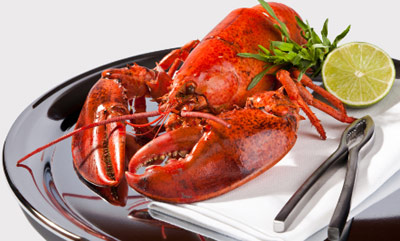
Pop quiz, children! (I imagine everyone I speak to as small children; I am on more than one sort of database.) Would you consider lobster to be a fancy food? Judging by the last time you took your significant other (your mom) out to eat at a fancy place, and after you saw the bill, tried to convince your date that you both had agreed to go Dutch, I would think, yes, it's fancy as caviar! (Caviar is eggs. Fish eggs. Fish excrete this and people pay good money to eat fish excretions.)
Newsflash: lobsters are bugs. They are essentially bigass bugs that scurry around underwater, because everything horrifying lives underwater or in Australia.
There was a time when lobsters were considered to occupy the bottom rung of the food chain. Like, if you ate them and somehow weren't a prisoner, then you didn't tell that shit to anybody. Today it would be like if you munched on whatever critters you found running around in the sewer. Hobos notwithstanding.
Oh, and that prison thing? It was considered cruel and unusual punishment to feed it to inmates more than a couple of times in a week.
But that doesn't really have anything to with cooking, now does it? You say.
True, but doesn't it piss you off a little bit?
Back to cooking.
One of the biggest moral quandaries having to do with lobster is that fact that they are often boiled alive in order to be cooked properly.
Damn that's cold.
Or is it?
Actually, lobsters' nervous systems are so primitive that they can't really feel it. Yes, yes, it's devouring their flesh and all that, but they're pretty much content with it. But if they're so content with it, then why do they scream when you boil them?! You ask, because you are apparently quite intent on barreling your way into my article. Back off, man, it's my turn to shine.
And to answer about the screaming. No. No. No.
Lobsters absolutely and utterly lack any form of vocalization. They cannot scream. At all. The sound you hear is that of steam escaping from underneath the crustacean's hard shell. Sort of like a really morbid tea kettle.
Cooking Myth #4: Fat is bad for you.
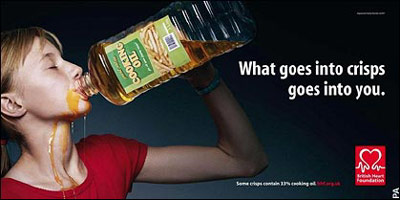
This is more of a nutritionist myth than anything, but it crops up often enough when cooking for other people that I feel the need to dispel the rumor.
"Hey, you guys want some nice juicy steaks? Or some delectable wild caught salmon?" I ask to all the people that I never actually cook for. Because I loathe them.
"Well, I would, but those things are so high in fat! And I'm trying to keep my figure!"
"You're fat from refusing to exercise, not my orgasmic cooking. So…eat one of these trouts, I guess."
And I don't have any friends.
Fat is not bad for you. In fact, as paradoxical as it's going to sound, you actually need fat…to get rid of fat. Seriously. There are multiple kinds of fats, and some of them are remarkably beneficial to your health, regardless of having the name "fats."
Omega fats, for instance, are absolutely wonderful for your body, offering more kinds of health benefits than I feel like listing here. But the catch is, you kind of need to get it from an outside source. Your body really dropped the ball on the whole "being able to create essential nutrients on its own" thing. So you have to find foods that have this icky fat in it. Fish and seeds are great for that. Or, if you hate having people stand very close to you, you could indulge in some fish oil. While it's quite good for you, it both smells and tastes sort of like something you would lick off of Ke$ha.
Also of note, you need fat for your body to absorb other nutrients. You need fat so your body doesn't start burning muscle or organ tissue to survive. And lack of fat can result in weak neurotransmitters, letting all of those signals in your body get thrown around all willy nilly like.
In order to avoid sounding like I'm any sort of authority on the matter, risking legal trouble from someone following my "health advice," I'm going to go ahead and end this entry with a quick word of advice: some fat is good, some fat is bad. Eating food with the good fat will actually help keep you in shape. Bad fat will make you look like someone who regularly gets into tussles with entire meatloaves and has never, ever, lost.
Cooking Myth #5: USE A PLASTIC CUTTING BOARD OR YOU'LL CATCH DYSENTERY FOR CHRIST'S SAKE!
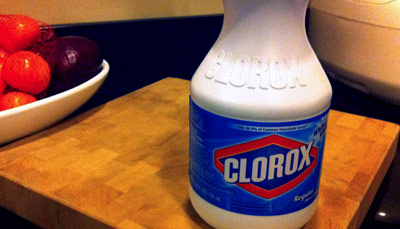
This one almost makes sense.
The rumor goes that when you cut raw meat on a wooden cutting board, the juicy, delectable bacteria previously kept inside of your ethanol soaked hunk of beef or chicken, now gets soaked into the scratches left from the knife marks that your sloppy ass carved into the board in the first place. And now your family has cholera.
As someone who never actually washes their cutting board, and is only vaguely aware of the concept of bacteria in and of itself, I have to admit that this one was never much of a priority for me. And honestly, even though I use it six or seven times a week, without walking into the kitchen to check, I have no leopard stroking idea what sort of cutting board I even use.
But some people apparently care. And at least a couple of them apparently cared enough to go through the process of becoming scientists and publishing a report on the subject. And what do they have to say on the subject? Well, you read the title of the fucking article, what do you think they said?
There's probably going to be some bacteria in there no matter what kind of cutting board you use. Plastic or otherwise. Is it going to hurt you? Probably not. It doesn't seem to be able to reproduce so well there. Especially with wood. And actually, wood seems to be slightly better at processing any bacteria that it does happen to ingest.
So what's the solution to just not get bacteria? Not put knife marks in your fucking cutting board? Sure, do that. Or just clean and wash your board regularly. That's about the best you can do. Unless you have a board made out of adamantium lying around somewhere. Then I would recommend just using that.
(Update: I found out what kind of cutting board I use. Finally had to go to the kitchen to refill my bucket of Welches sparkling grape juice so I checked for you. You're welcome. It wasn't wood or plastic. It was my roommate Seth. He was bleeding pretty bad. Looks like he died sometime last week…just kidding! Haha! Yeah, that was a joke. …I have no idea how to tell how long someone has been dead based on their corpse's rate of decomposition.)
Cooking Myth #6: You can cook away alcohol.
I had to save this one for last, because if I led off with it, you would never have read my damned article, because you would have been too busy running off with your friends to try and get shitfaced off of beer battered shrimp. And technically speaking, yes, you can do that.
But more accurately, no, no you can't.
I'm sure you figure the alcohol "cooks out." And you're partly right. Just like the salt earlier in the article though, it's all about quantity and ratios and other bullshit.
It comes down to how long you cook the alcohol. Even simmering alcohol for 20 minutes or so can leave as much as 50% of the alcohol behind. Now, if you're hoping to play a hilarious prank the next time you babysit your friend's kids by making them eat some beer battered onion rings or spaghetti cooked in vodka sauce, and then making those kids get shitfaced, remember that it won't work. In most recipes calling for alcohol, it's in quantities that would make it impossible to even get a buzz. And I'm sorry about that. Because you're right, drunken children would be goddamned hilarious.
I suppose if you're a really dedicated alcoholic who wants nothing more than to create the most disgusting beverages you can possibly make without using your own bodily excretions, then you could simmer some pure vodka for a while and drink what comes out. And yes, you would get drunk.
So there you go. You still can't cook. But at least you can feel better about yourself the next time your "chef" friends spout off about one of these rumors and you can correct them for a change.
Dick.


